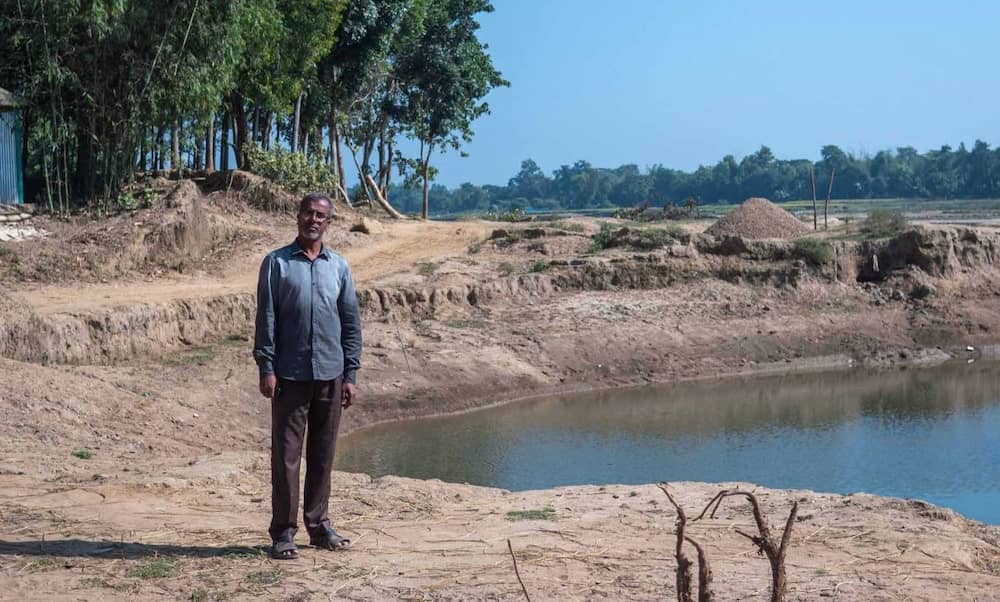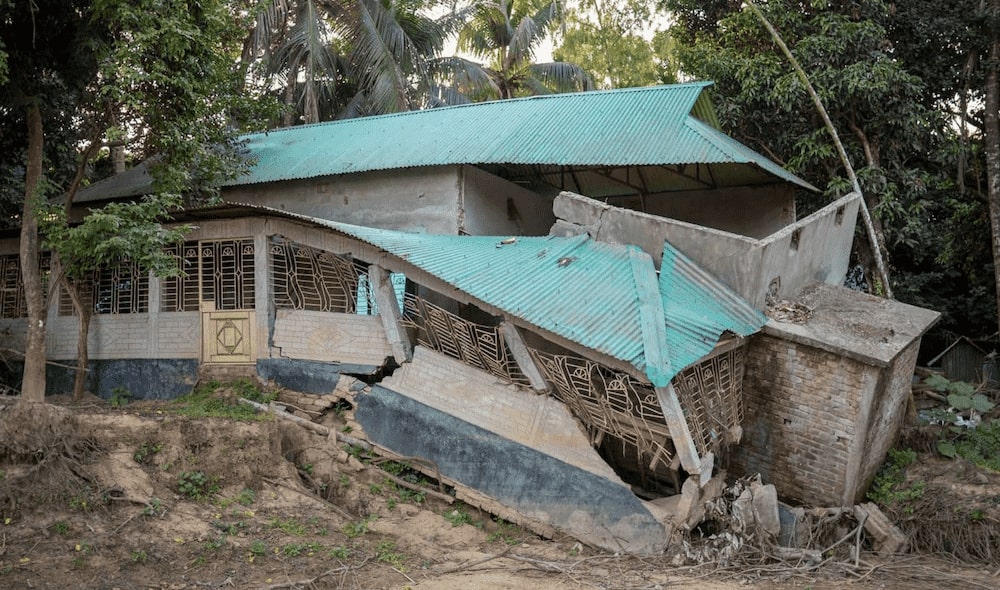
The loss and damage conversation largely centres around the economics of climate impacts. Losses and damages which are difficult to value on a monetary scale are termed ‘non-economic losses and damages’, often left out of the equation, and often misunderstood. Moreover, there is a limited appreciation of the connections between what is deemed economic and non-economic. This all leads to inaccurate representations of, and debates on, how people and societies experience losses and damages. We propose a values-based approach to losses and damages to address these issues.
Issues with the current discourse
The disproportionate focus on easily quantifiable and identifiable economic climate impacts discounts the full extent of how people and societies are affected by climate change. We recently spoke with a Bangladeshi woman who lost her house during flooding in 2022. If we only wrote about her house, we would leave out her traumatic experiences related to flooding. This includes the depression, insomnia, and amnesia she now experiences, and the instance when her son suggested that her family should “take a boat and drown altogether to death” as they lost all their possessions. Our current monetary and utilitarian lens on losses and damages reduces a complex issue to mere numbers and means we can never fully address losses and damages. Just reconstructing the woman’s house will not address the severe impact on her mental well-being.
The few reports focussing on these invaluable impacts, such as loss of biodiversity or cultural heritage, are often guided by ‘categories’ similar to the ten main types of non-economic loss proposed by the UNFCCC in 2013. There are a thousand ways to experience loss, but we keep looking in the same places by holding onto pre-determined types specified by Western experts in a top-down manner; affected societies have little or no say in what is examined.
This dichotomization of the economic and non-economic has resulted in a disconnect between the concepts. However, at the local level the two are heavily entangled, with one frequently cascading into another. Therefore, a thorough and integrated understanding of one is needed to fully comprehend the other. However, this understanding is lacking and reports commonly only focus on economic or on non-economic impacts.
Values-based losses and damages
The adaptation discourse also disproportionately focuses on material aspects. In response, scholars developed the concept of values-based adaptation with the premise that knowing what people value in their everyday lives is crucial to achieving fair and effective adaptation. ICCCAD and IIED are researching the needs connected to losses and damages in North-Central Bangladesh by taking a similar approach. Below, we describe how this new approach, which we call values-based loss and damage, addresses the aforementioned issues.

What counts as a loss or damage is partly determined by if society values and depends on it. Therefore, we apply the concept of lived values to explore what the affected people and societies values most in their daily lives and in the places where they stay. We worked with local people to condense information on values into ten priority areas. These were used to guide interviews that examined losses and damages. This is similar to how current non-economic loss and damage studies utilize the main types developed by the working group of the UNFCCC. However, a major difference is that the local values, the exact terms used, and their descriptions are generated in a locally-led and context-sensitive manner. For example, education, religion, development and family are key components of Bangladeshi society, yet are not put at the forefront by the UNFCCC process. In our research, affected societies determine the parameters within which we operate. Researchers or practitioners, often outsiders to the societies, should not decide what to write about; the values-based approach supports listening.
Values-based loss and damage also allows us to go beyond a normative understanding of climate impacts. Local values will differ across countries, communities, and individuals. Data shows that, in the research area we chose, the younger generation values education more while the elderly give more priority to health, and women give more importance to mental health than men do. Impacts also differ within each value. For example, men feel shame in front of their families now that climate change impacts (e.g., temperature rise and rainfall decreases) reduces their income generated from agriculture. The resultant economic constraint decreases women’s abilities to receive guests, this while hospitality is a key component of rural Bangladeshi culture.
The latter two examples also show the cascading and interconnected nature of losses and damages. Therefore, the values-based lens unifies the economic and non-economic by assessing both. A house provides more than shelter, it is a place of memories, hospitality, and safety, a school signifies striving for a better future and knowledge creation, and income allows parents to cook or provide for their families. Thus, monetary measures do not only provide shelter or nutrition; they will also bring unity, serenity, and safety. Highlighting this connection is crucial to make decision-makers aware of the scale and diversity of climate impacts and the importance of mobilizing the trillions required to properly address losses and damages.
However, more than strengthening the case for economic impacts, values-based loss and damages highlights the importance of non-economic climate impacts. Participants in the research we are doing emphasize the values of family, religion, nature, education, and health. In this light, a man who recently lost his house said that “if we don’t have a peaceful mind, money is worthless”. Impacts on these values often cannot be alleviated or addressed with monetary solutions. For example, when a Hindu crematory site was washed away during recent floods, a man’s inability to use his arm after a stress-induced stroke, and ancestral lands lost after floods and rapid riverbank erosion. The latter also caused the fragmentation of communities and families. None of these losses and damages have a readily available solution. Derived from local values, the values-based approach can allow affected societies to reveal the often invisible non-economic climate impacts. Moreover, it gives researchers and practitioners the opportunity to hear about ways to respond to non-economic losses and damages.
A way forward
Loss and damage is gaining increasing attention from the media and decision-makers after the establishment of the Loss and Damage Fund at COP27. Therefore, now it is important that coverage, debates and negotiations accurately reflect on-the-ground experiences to identify appropriate and adequate measures for addressing losses and damages. Climate change is impacting millions of people’s lives in every way imaginable, we can no longer accept superficial stories of lost homes and damaged houses, nor to only focus on the non-economic parts. We must show the full picture, which means defying the false dichotomy of the division between economic and non-economic loss and damage, and to recognize the importance of the latter. Only then, our studies, stories, and policies will truly reflect what societies are experiencing and what future generations will increasingly experience. Values-based loss and damage can be a tool to reach this goal. A tool for outsiders to listen and for affected societies to voice their experiences and needs; a tool to guide the mobilisation of loss and damage finance and implementation of the Santiago Network on Loss and Damage. One of the consequences of this is that the response from those wishing to help affected societies should not only be monetary, but to show empathy, solidarity, and friendship. Basic human values that we all have and can give if we wish.
About The authors:
Douwe van Schie is a visiting researcher at the International Centre for Climate Change and Development (ICCCAD) with the support of the International Institute for Environment and Development (IIED).
Saleemul Huq is the director of the International Centre for Climate Change and Development (ICCCAD)
Simon Anderson is a senior fellow at the International Institute for Environment and Development (IIED).







